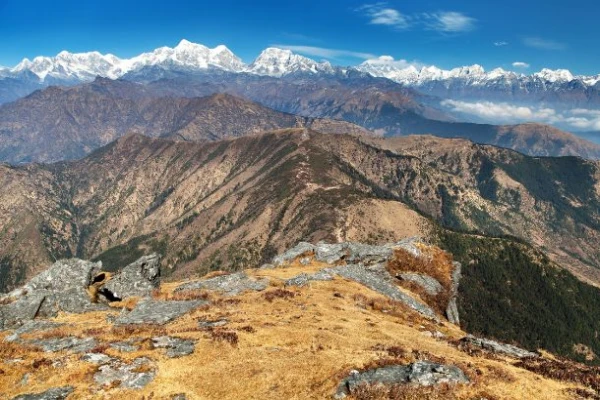On world highest Mt. Everest with sweeping panorama of Khumbu ice falls and glaciers.
Express Everest Base Camp Trekking is one of the most exciting Himalayan adventures that takes you to the foothills of the highest peak in the world, Mt. Everest [8,848 meters/ 29,028 feet]. Every trekking enthusiast all over the world has dreamed of conquering the highest base camp adventure in the world, Everest Base Camp [5,364 meters/ 17,598 feet] at least once in a lifetime. Besides the enthralling natural prospects, you will also get the opportunity to experience the unique high-altitude culture, traditions, lifestyle, and hospitality of the daring Sherpa communities that have dominated the mountaineering industry.
Your Express Everest Base Camp Trekking will also include a sightseeing day of the UNESCO World Heritage in Kathmandu. So, overall this classical trekking package will introduce you to the deep-rooted culture in the capital valley, the most iconic views of the Himalayan vistas, diverse landscapes from lush forests to glacial moraines, charming Himlayan settlements, and the endangered flora and fauna of the Sagarmatha National Park (est 1976). So, if you are looking for the most fulfilling Himalayan trekking adventure that has it all, this mainstream trekking adventure is the most ideal package for you.
Best Season for Express Everest Base Camp Trekking

Although the Mount Everest base Camp Trek is a year-round adventure, the ideal period for this epic Himalayan adventure is considered to be during the autumn and spring seasons. Known as the peak seasons, both spring and autumn provide the most favorable climatic conditions for an immersive and memorable trekking experience.
However, even among the peak seasons, the autumn season, in particular, is considered to be the best season for outdoor adventures due to its mild temperatures. The temperature of the Everest region averages around 12°C to 18°C during the months of this season, so you can expect cool and chilly morning and evening breezes to accompany your day-to-day trekking adventures. Similarly, due to low precipitation, the days are clear, and you can enjoy the unobstructed clear views of the Himalayan vistas.
As for the spring, although it is slightly warmer than autumn, with the temperatures hovering around 15°C to 22°C, you can expect a comfortable experience even at the alpine altitudes. Similarly, the stunning visual of the blooming season, clear mountain views, lush landscapes, and the wildlife exploration of the Sagarmatha National Park add magic to trekking adventure in this season.
What is the Difficulty Level of the Everest Trek?

Everest Trek is the highest base camp adventure in the world that explores the foothills of the tallest snow-clad figurine in the world. Doing this is trek is a lifelong dream of every trekking enthusiast, so, if you are wondering what is the difficulty level of this classical Himalayan adventure, rest assured, Mount Everest Base Camp Trek has been graded as a ‘moderate’ trekking expedition. It means that you won’t need any kind of technical skills or mountaineering skills to participate in this Himalayan exploration, although having experience will be helpful.
One of the most significant challenges of this adventure is the altitude gain, starting your adventure at Lukla (2,820 meters), you will overcome high elevation points like Namche (3,440 meters), Dingboche (4,340 meters), Lobuche (4,960 meters), Gorakshep (5,164 meters), Everest Base Camp (5,364 meters) and Kalapatthar (5,643 meters). Similarly, you will cover an approximate trekking distance of 130 km (80 miles), around 12 km (7.4 miles) during each day adventure. So, considering these factors and the average trekking distance of 6-7 hours during each day of your adventure, you should prepare for the trek.
Training and Preparation
If you want to have a comfortable experience during your Express Everest Base Camp Trekking, making efforts in your preparation part is a crucial factor. You are recommended to train at least 4-6 weeks prior to your trekking adventure, as this way, your body will get accustomed to the physical activities even if you are not that physically active. If you are an athlete or work out routinely, you can set the training period according to your needs.
As you will be covering long hours of trekking at rising altitudes, carrying your back on top of it, it is recommended that you should emphasize strength and endurance training. Similarly, cardiovascular exercises boost your stamina stock and help you acclimatize properly to the rising altitudes. Here are some recommended exercises that you can include in your training and preparation.
Strength and Endurance Exercises: Plank, push up, pull up, lunges, squat, deadlift, bicep curls, dips, overhead press, leg press, calf raise, etc
Cardiovascular Exercises: Running, squat jumps, burpees, dancing, rowing, rope jumping, aerobics, cardio, swimming, etc.
Food and Accommodation

Express Everest Base Camp Trekking is a mainstream trekking route in Nepal, so during your exploration, you can expect a good level of food and accommodation services. The trails of this iconic Himalayan adventure also offer you the opportunity to explore the diverse and delightful cuisines. From tasty regional dishes to Tibetan- Indian culture-inspired dishes, and some of the star international dishes with Nepali touches, the food palate exploration is limitless during this trekking adventure.
For food, you can expect the following menus at the tea houses along your trekking route (both vegetarian and vegan options are also available):
For Breakfast: For breakfast, you can expect light meals like eggs, Tibetan bread, toast, or bread with jam, honey, and butter. Similarly, chapati, paratha, muesli, pudding, oatmeal, cornflakes, pancakes, etc, are some of the star breakfast dishes.
For Lunch and Dinner: As for lunch and dinner, you can expect a wide variety of menus like dal bhat tarkari (traditional dish comprised of steamed rice, lentil soup, vegetables, and pickles), thakali khana set, dhindo, gundruk, momo, chowmein, pizza, sandwich, steak, spring roll, shyaphale, thukpa, rildok, etc
**Note: As Express Base Camp Trekking is a services-oriented package, you will have to pay for all food expenses by yourself during the trek**
Accommodation
As this is a mainstream trekking route in the country, the accommodation facilities are also well-developed. You can expect a moderate to luxurious level of accommodation and other related amenities during this Himalayan exploration. In your most standard trekking package, you will rest in a well-furnished room with two to three adjacent beds. The beds are equipped with comfortable mattresses and clean sheets, and you will also receive pillows and warm blankets during your stay.
Similarly, like your accommodation, in your regular package, you will use the bathroom on a shared basis. The bathroom facilities at the lower region are in Western style and well-developed, while there are traditional-style bathrooms at the higher altitudes. You can upgrade your package to luxurious for a more personalized experience.
Related Packages:

.webp)

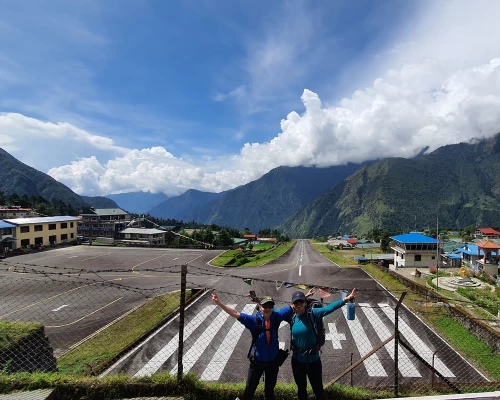
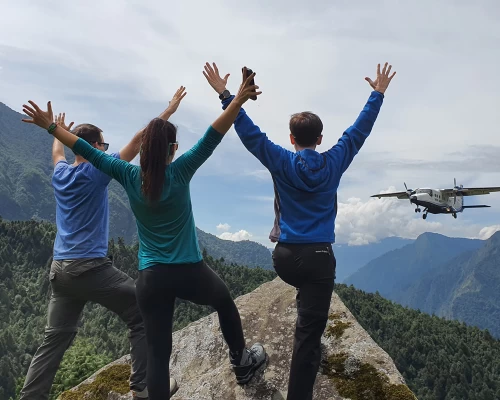
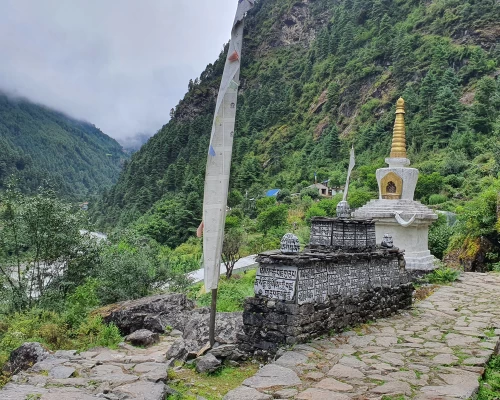
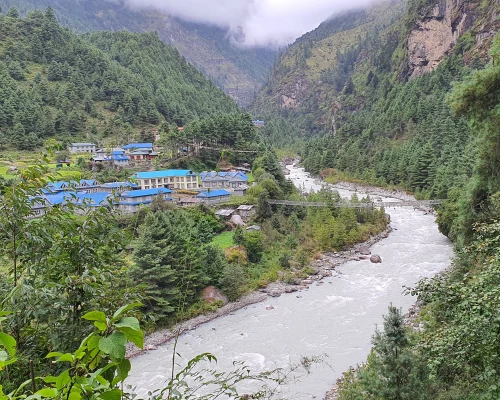
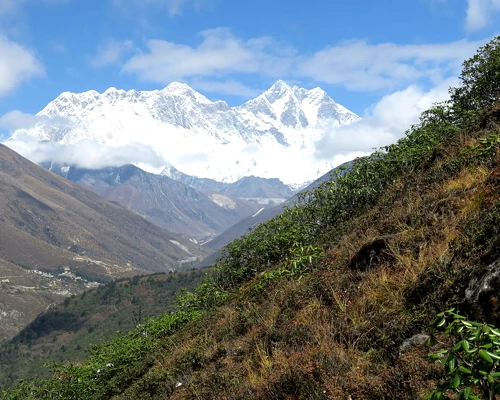
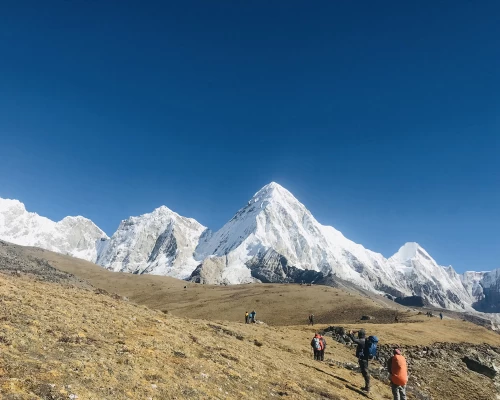
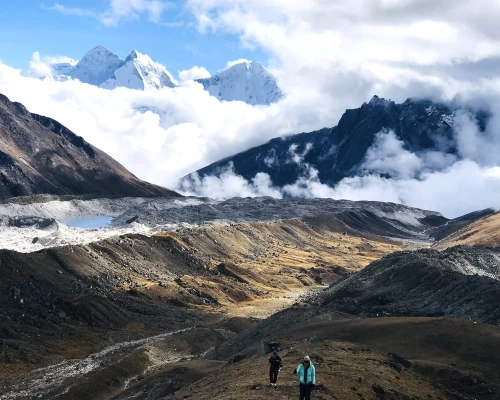
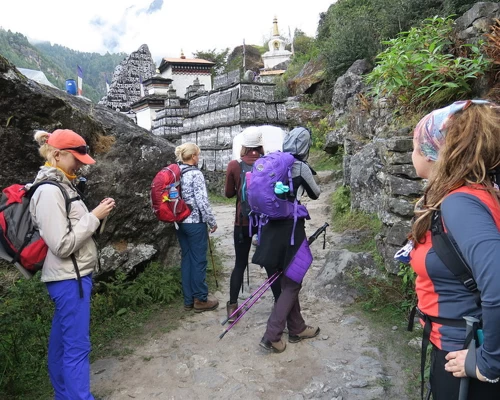





.webp)
.webp)
